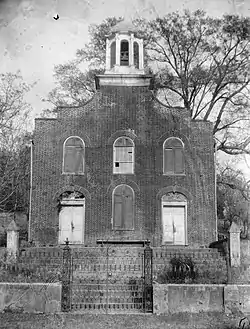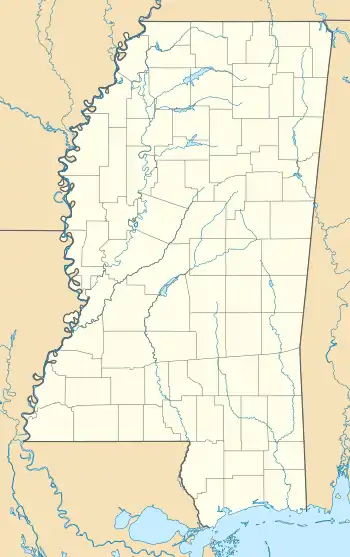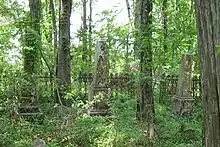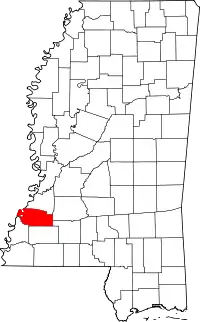Rodney, Mississippi
Rodney is a former city in Jefferson County in southwest Mississippi, approximately 32 miles (51 km) northeast of Natchez. Rodney was founded in 1828, and in the 19th century, it was only three votes away from becoming the capital of the Mississippi Territory.[3] Its population declined to nearly zero after the Mississippi River changed course. The Rodney Center Historic District is listed on the National Register of Historic Places.
Rodney Center Historic District | |
 Former First Presbyterian Church | |
  | |
| Location | Jefferson County, Mississippi |
|---|---|
| Nearest city | St. Joseph, Louisiana/Lorman, Mississippi |
| Coordinates | 31°51′41″N 91°11′59″W |
| Area | 60 acres (24 ha) |
| Architectural style | Greek Revival, Gothic Revival, Federal |
| NRHP reference No. | 80002255[1] |
| Added to NRHP | August 29, 1980 |
Rodney, Mississippi | |
|---|---|
| Nickname(s): "Petite Gulf", "Little Gulf" | |
| Country | United States |
| State | Mississippi |
| County | Jefferson County |
| Founded | 1828 |
| Elevation | 82 ft (25 m) |
| Population (2010)U6 | |
| • Total | >0 |
| Time zone | UTC-6 (EST) |
| GNIS feature ID | 676809[2] |
Today a small number of inhabitants remain[4] but the area is considered a ghost town and reliable data is hard to find as the town is not listed as a separate entity by the census bureau.[5]
Early history
Rodney was originally settled by the French in January 1763 and named Petit Gouffre,[3] meaning "Little Chasm". As a result of the French and Indian War, the area was taken by Great Britain. Spain would later control this area after taking West Florida from the British in 1781. Spain would hold the site until selling it to Thomas Calvit in 1798. "In 1802, Judge Wm. B. Shields of Delaware was appointed to the Mississippi Territory and arrived at Rodney or "Petit Gulph" in the company of Judge Thomas Rodney, who was also of Delaware."[6] The city was later renamed Rodney in 1828 in honor of Judge Thomas Rodney.[7]
Structures

The Old Rodney Presbyterian Church was dedicated in 1832. It is located at the middle section of the town, across the Rodney – Red Lick – Lorman Road from Alston Grocery Store. Formerly at the south edge of the town was Sacred Heart Catholic Church, built in 1869. On the southeast corner of Rodney lies Alston's Grocery, operated by the Alston family since 1915.[8]
Population
The 1850 United States Census listed the population of Rodney as 210.[9]
Notable people
Baseball Hall of Fame pitcher Bill Foster came to Rodney as a child, where he was raised by grandparents Foster was a star left-handed pitcher in the Negro leagues.[10]
References
- "National Register Information System". National Register of Historic Places. National Park Service. March 13, 2009.
- U.S. Geological Survey Geographic Names Information System: Rodney
- "Ghost Town of Rodney". Southpoint Travel Guide. Retrieved July 8, 2008.
- Grayson, Walt. "Rodney Presbyterian Church". 2001–2011 WorldNow and WLBT. Retrieved February 24, 2011.
- "Rodney, Mississippi". Retrieved February 24, 2011.
- Brown, Ann. "Church Hill Jefferson County Tidbits #26 & #27 From the WPA Records". jeffersoncountyms.org. MSGenWeb. Retrieved June 13, 2019.
- Roland, Dunbar. Mississippi. Southern Historical Publishing Association, 1907.pg 574
- "Rodney, Mississippi". Civil War Album. Retrieved July 8, 2008.
- "Population of such Cities, Towns, Townships, Hundreds, etc., in the United States, As Have Been Ascertained at the Census Office" (pdf). p. 42. Retrieved January 9, 2009.
- "Bill Foster". Mississippi Sports Hall of Fame. Archived from the original on January 3, 2015. Retrieved January 2, 2015.
